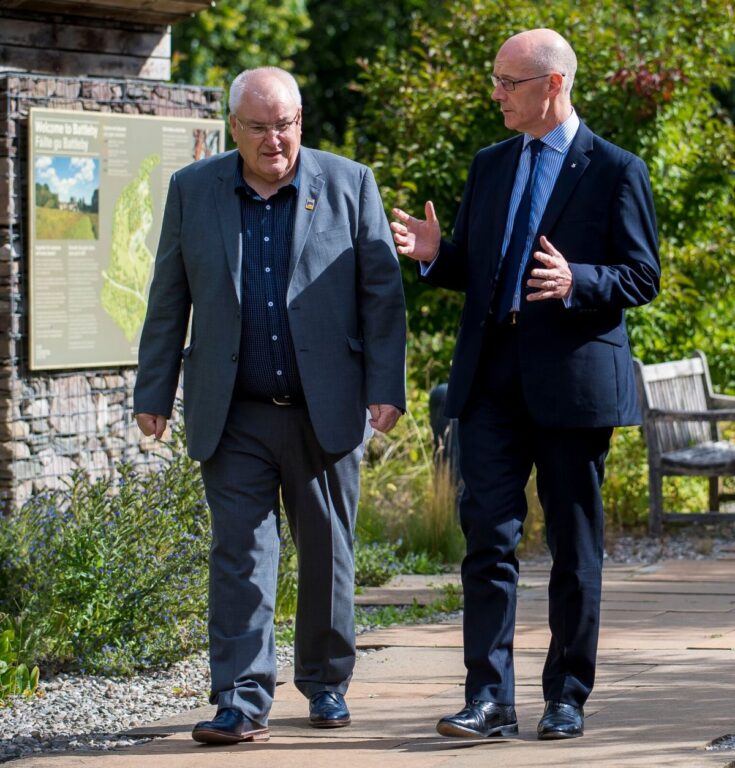Gaelic set for big boost as public bodies reveal range of new, key commitments

Bòrd na Gàidhlig has today (Thursday 9 August 2018) revealed a series of key commitments from a range of public bodies in Scotland which will significantly accelerate progress in the development and use of Gaelic across the country.
This follows a milestone meeting chaired by Deputy First Minister, John Swinney MSP, in Perth this morning, at which many of Scotland’s key public bodies were represented.
In signing off on this series of pledges, Scotland’s national agency for the promotion of Gaelic language and culture believes that it can engineer a faster rate of progress.
Each will underpin the objectives of the National Gaelic Language Plan 2018-2023 which was launched in April, this year. The new plan aims to ensure Gaelic is used more often, by more people, and in a wider range of situations.
Key commitments revealed today include:
- VisitScotland will publish the first ever Gaelic tourism strategy for Scotland in the autumn, bringing together the tourism industry and Gaelic more effectively to ensure that each benefits the other
- Scottish Qualifications Authority, Education Scotland, Stòrlann, representatives of the Gaelic Local Authorities Network and the Scottish Government will support schools in strengthening the secondary GME curriculum by developing a planned approach to increasing the National Qualifications offered through the medium of Gaelic in the senior phase
- Skills Development Scotland and Bòrd na Gàidhlig will convene a Working Group to consider and take into account the recommendations of the “Gaelic Language Labour Market – The Evidence Report” that was published in June 2018
- Comhairle nan Eilean Siar have offered to provide Gaelic learning through e-Sgoil to all local authorities across Scotland
- Comhairle nan Eilean Siar, Bòrd na Gàidhlig and the Scottish Government will work together to deliver a community offer in the Western Isles
- MG ALBA and Bòrd na Gàidhlig will work together on LearnGaelic, the partnership resource for Gaelic learning – this will involve the revision of the website, the creation of new content, and new support for Gaelic adult learners
- Highlands and Islands Enterprise will undertake new research on ‘The Role of Gaelic Language and Culture in Economic and Community Development’ which will further build the evidence base to support new approaches and future planning. HIE will also offer to support Scottish Enterprise in developing their first Gaelic Language Plan
- MG ALBA will launch Gaelic YouTube material – This will involve what they describe as ‘curated content’ in the form of small sections from programmes – music, comedy, and short film. In addition, ‘digital participation’ initiatives will encourage people to create their own content in Gaelic
Deputy First Minister John Swinney MSP comments:
“The Scottish Government has set out a clear mandate for the support of Gaelic. Today’s meeting shows that there is a variety of activities being undertaken by a wide range of public bodies across Scotland in support of the language and it is important that we capitalise upon this to move the agenda forward.
“I am pleased that agreement has been made on these key commitments and I hope that we can all work together to develop further commitments in the coming months.”
Bòrd na Gàidhlig chairman Allan MacDonald comments:
“These commitments are to be warmly welcomed. They reflect a deepening commitment from a range of public bodies to Gaelic language and culture in Scotland. Gaelic no longer sits at the periphery of our nation’s consciousness because the cultural, educational and economic benefits are clear.
“These pledges will significantly aid our plans outlined in the National Gaelic Language Plan 2018-2023. We look forward to working with our partners across the country in delivering these innovations for the good of the country.”
